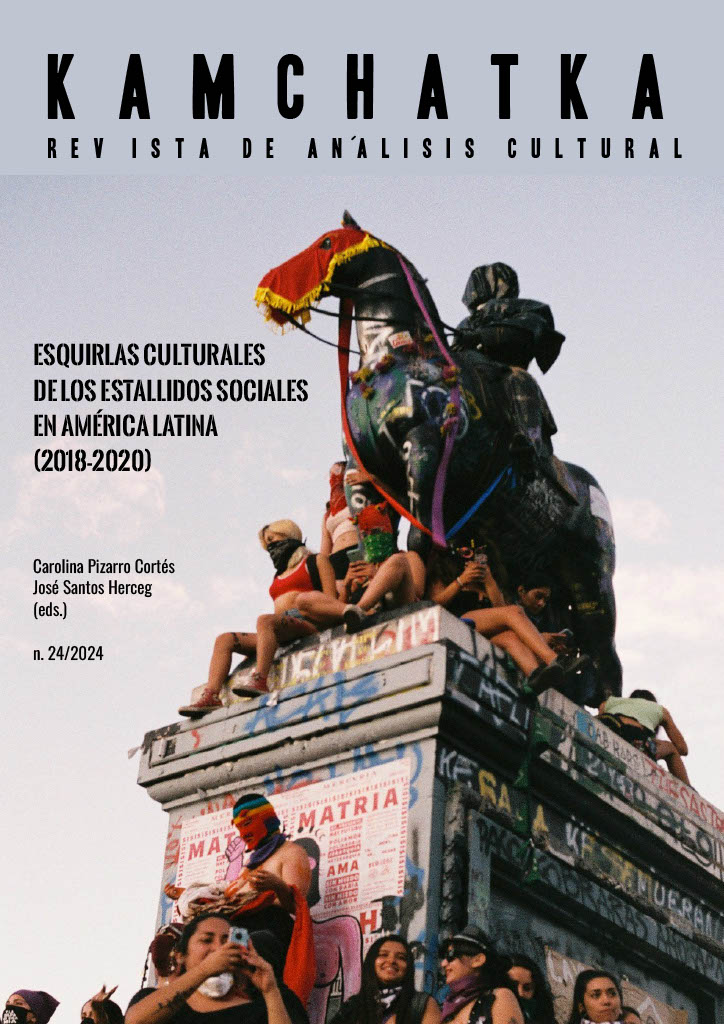From the street to the web:
testimonies of the artistic protest of October 2019 and its continuity on digital platforms
Keywords:
social outbreak, visual event, testimony, archive, digital platform Abstract
Abstract
The revolt, outbreak or social revolution of October 2019 in Chile was a period of intense visual street manifestation, characterized by a proliferation of texts, images and testimonial performances. Attending to this phenomenon of significant overabundance, records were immediately generated, as well as publications and platforms aimed at preserving urban interventions, according to intentions and procedures of a contemporary archivistics. The aim of this article is to analyze, from the strategies they use, initiatives that digitally recover records of visual events of protest and integrate them into a larger and more complex unit: the repository Voces en el muro (UTEM), the photographic work La ciudad como texto (C. Ureta) and a chapter of the YouTube series Olvidarte nunca(CanalPobrecitoMortal). These initiatives constitute open narratives that share four specific features: (1) they are third-order elaborations that integrate and resignify records of visual events; (2) they link the records to the precise space in which the visual event unfolds; (3) they generate a type of contact with the user of the interface that goes beyond passive observation and opens up the possibility of interaction; and (4) they account for the constructive process -both of the second-order record and of the platform- so that, to different degrees and measures, they expose how to do things with images.
 Downloads
Downloads
 References
References
Aravena Núñez, Pablo (2019). “Andrés Maximiliano Tello. Anarchivismo. Tecnologías políticas del archivo”. Cuadernos de Historia N°51:255-260. https://cuadernosdehistoria.uchile.cl/index.php/CDH/article/view/55061/59046
Bal, Mieke (2005) “El esencialismo visual y el objeto de los estudios visuales”. Comunicación Y Medios (16): 45-68.
Canal Pobrecito Mortal (2019). Olvidarte nunca. Cap. 16, Wladimir Osorio. https://www.youtube.com/watch?v=AHzmIEh3h8g&list=PL9vWxi54VSKLjORdbHNlKc3upWx6glg5I&index=17
García Ibarra, María Yolanda (2024) “Un propósito: repensar nuestros archivos como productores de presente. Reseña de Anarchivismo. Tecnologías políticas del archivo de Andrés Maximiliano Tello”. Bajo el Volcán. Revista del Posgrado de Sociología N° 10: 469-477.
Gutiérrez Muñoz, Óscar y Toro Ulloa Cristian (2021). “Archivo y transmedialidad. Propuestas digitales en el contexto del estallido social chileno”. El Ornitorrinco Tachado. Revista de Artes Visuales N° 14. https://doi.org/10.36677/eot.v0i14.15815
Olivari, María Cecilia (2022). “Torsiones de archivo: ensayos visuales y nuevas formas de inteligibilidad histórica a partir de la revuelta en Chile” (2019-2020)”. Aletheia, 13(25), e138. https://doi.org/10.24215/18533701e138
Pizarro Cortés, Carolina (2023). “Modulaciones narrativas de lo testimonial”. Chile a cincuenta años del golpe de Estado del 11 de septiembre de 1973: Reflexiones en torno al pasado y el presente. Faúndez Abarca, Ximena, Rebolledo Hernández Daniel y Sagredo Mazuela, Omar (eds.). Santiago / Valparaíso: Corporación Parque por la Paz Villa Grimaldi / Universidad de Valparaíso: 297-320.
Tello, Andrés (2018a). Anarchivismo: Tecnologías políticas del archivo. Buenos Aires / Madrid: La Cebra.
Tello, A. (2018b). “Una archivología (im)posible. Sobre la noción de archivo en el pensamiento filosófico”. Síntesis. Revista de filosofía V. I N° 1: 43-65.
Ureta, C. (2019). La ciudad como texto. https://www.laciudadcomotexto.cl/
UTEM (2019). Voces en el Muro. https://www.vocesenelmuro.cl
Valenzuela, J. (2019). “Estallido gráfico”. Afluente. https://afluente.cl/estallido-grafico.html.
Valles, P (2020). “Las manifestaciones y expresiones gráficas del estallido llegan a los libros”. La Tercera. https://www.latercera.com/culto/2019/12/20/manifestaciones-estallido-libros/
Zielinski, S. (2015) “AnArcheology for AnArchives: Why Do We Need—Especially for the Arts—A Complementary Concept to the Archive?”. Journal of Contemporary Archeology V. 2 N°1: 116-125. https://doi.org/10.1558/jca.v2i1.27144
Downloads
Published
How to Cite
-
Abstract1
-
ARTÍCULO PDF (Español)0
Issue
Section
License
This journal provides an immediate free access to the content on the principle that freely make investigation available to the public, which promotes an increased global knowledge exchange.
Unless otherwise indicated, texts published in this journal are under the license Attribution-NonComercial 4.0 by Creative Commons. These texts may be copied, distributed and publicly communicated whenever the publication’s author and title are quoted and whenever they are not used for commercial purposes. In any case, intellectual property of the articles and its potential economic rights entirely belong to its authors.
The full license can be consulted on https://creativecommons.org/licenses/by-nc/4.0/. We encourage authors to disseminate papers published in Kamchatka. Journal of cultural analysis electronically, in institutional digital repository or in their websites.





